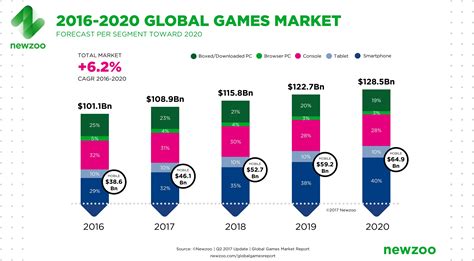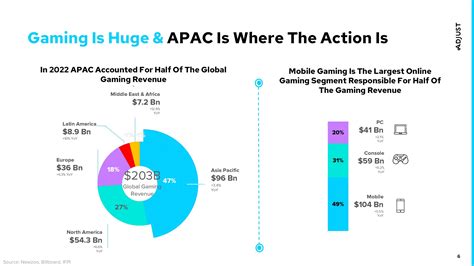Breaking News


Popular News


Explore the rise, growth, trends, challenges, legal implications, and future outlook of mobile gaming. Learn about monetization strategies and regulatory factors.In recent years, mobile gaming has experienced a substantial rise in popularity, revolutionizing the gaming industry and providing lucrative opportunities for developers and businesses. With the ever-increasing advancements in technology and the widespread accessibility of smartphones and tablets, the global landscape of mobile gaming has expanded exponentially. This blog post will explore the various facets of this burgeoning industry, including the rapid rise of mobile gaming, the potential for market growth, emerging trends shaping the industry, challenges faced in monetization strategies, the regulatory and legal implications, and the future outlook for the mobile gaming industry. As we delve into each subheading, we will uncover the vast potential for success in the mobile gaming market, while also addressing the obstacles and complexities that are inherent in this competitive and dynamic field. Whether you’re an avid gamer, a developer, or an investor, understanding the opportunities and challenges in the global mobile gaming landscape is crucial for navigating this rapidly evolving industry.
Contents

Gaming has come a long way from being limited to bulky consoles and personal computers to being accessible on the go through smartphones and tablets. With the advancements in technology and the increasing popularity of mobile devices, the mobile gaming industry has experienced an unprecedented rise in recent years. As smartphones continue to become more powerful, developers have been able to create immersive and high-quality games that rival traditional console and PC titles.
One of the key factors contributing to the rise of mobile gaming is the convenience it offers. Consumers no longer have to invest in expensive gaming hardware or be tied down to a specific location to enjoy their favorite titles. Mobile games can be played anytime, anywhere, making them incredibly appealing to a wide audience. Additionally, the App Store and Google Play Store have made it easier than ever for developers to distribute their games to a global audience, further fueling the industry’s growth.
Furthermore, the rise of mobile gaming has opened up new opportunities for indie developers and smaller studios to compete with established giants in the gaming industry. The lower barrier to entry and the ability to easily reach a large user base have allowed innovative and creative games to thrive in the mobile space. This has led to a diverse range of gaming experiences, catering to a variety of tastes and preferences.
In conclusion, the rise of mobile gaming has revolutionized the way we experience and consume games. As technology continues to evolve and mobile devices become even more powerful, the potential for growth in the mobile gaming industry remains immense. With the global reach and accessibility of mobile gaming, it is clear that this trend is here to stay, shaping the future of the gaming industry as a whole.

Mobile gaming has seen exponential growth in recent years, with the global market reaching unprecedented levels of success. According to statistics, the market is expected to grow at a compound annual growth rate (CAGR) of 12% from 2021 to 2026, reaching a staggering $183.5 billion by the end of the forecast period. This growth can be attributed to several factors, including the widespread adoption of smartphones and tablets, as well as the increasing accessibility of high-speed internet connectivity.
Furthermore, the potential for market expansion in emerging economies is considerable, as more and more individuals gain access to mobile devices. The opportunities for developers and publishers are vast, as they can tap into previously untapped markets and cater to a wider audience. With the rapid advancement of technology, mobile gaming is expected to become even more mainstream, presenting an array of possibilities for revenue growth and market expansion.
However, along with these opportunities come certain challenges. The market is becoming increasingly saturated, making it harder for new entrants to carve out a niche for themselves. Additionally, the fierce competition among established players means that smaller developers and publishers may struggle to gain traction in the market. These challenges highlight the need for innovative strategies and a deep understanding of consumer behavior in order to succeed in this highly competitive landscape.

In the rapidly evolving landscape of mobile gaming, several trends have emerged that are shaping the future of the industry. With technological advancements and changing consumer preferences, game developers are constantly innovating to keep up with the latest trends. One of the prominent emerging trends in the mobile gaming industry is the rise of cloud gaming. This technology allows players to stream games directly from the cloud, eliminating the need for high-end hardware and enabling cross-platform gameplay.
Another significant trend is the growing popularity of augmented reality (AR) and virtual reality (VR) in mobile games. The integration of AR and VR technologies not only enhances the immersive gaming experience but also opens up new possibilities for interactive and location-based games. As smartphone capabilities continue to improve, game developers are increasingly exploring these technologies to create unique and engaging gaming experiences.
Furthermore, the subscription-based business model is gaining traction in the mobile gaming industry. With subscription services offering access to a library of games for a fixed monthly fee, players are provided with a more affordable and convenient gaming experience. This trend not only benefits gamers but also provides a more predictable revenue stream for game developers.
Lastly, cross-platform gaming is becoming increasingly prevalent as players seek seamless experiences across multiple devices. Game developers are focusing on creating games that can be played on various platforms, including mobile, console, and PC, to meet the demands of a diverse player base. As the mobile gaming industry continues to evolve, these emerging trends are expected to shape the future of gaming and create new opportunities for both players and developers.

Monetization is a crucial aspect of mobile gaming that involves generating revenue from the game. With the increasing competition in the industry, developers are facing various challenges in effectively monetizing their games.
One of the major challenges in monetization strategies is the advertising model. While ads can generate revenue, they can also disrupt the gaming experience and lead to user dissatisfaction. It’s essential for developers to find a balance between ad placements and the overall gameplay to ensure a positive user experience.
Another challenge is the in-app purchases model. While this method can be lucrative, developers need to be cautious about not making the game too reliant on in-app purchases, as this can alienate players and lead to negative reviews.
Furthermore, pricing and payment models also present challenges for developers. With varying purchasing power across different regions, developers need to consider pricing strategies that are attractive to players while still generating revenue.

As the mobile gaming industry continues to expand rapidly, companies are facing a multitude of regulatory and legal challenges. One of the biggest issues is the varying laws and regulations across different countries, which can make it difficult for developers and publishers to navigate the global market. In some regions, there are strict rules on gambling within games, while in others, there are specific data privacy and security regulations that must be adhered to.
Furthermore, the rise of loot boxes and in-game purchases has brought about increased scrutiny from regulatory bodies. Many countries are considering legislation to classify these types of transactions as a form of gambling, which could have significant implications for gaming companies and their revenue streams. Developers are also facing pressure to ensure that their games comply with consumer protection laws, especially when it comes to advertising and marketing to children.
On top of these challenges, there is also the issue of intellectual property rights and licensing agreements. The mobile gaming industry relies heavily on the use of intellectual property, and companies must carefully navigate the legal landscape to avoid copyright and trademark infringement. Licensing agreements are also complex, requiring a deep understanding of contract law and negotiations to ensure that all parties are protected.
Overall, the regulatory and legal implications in the mobile gaming industry are complex and ever-changing. Companies must stay abreast of the latest developments in laws and regulations, and invest in legal counsel to ensure compliance and mitigate the risk of costly legal battles.

In the future, the mobile gaming industry is expected to continue its rapid growth and expansion as technology continues to advance and consumer demand for entertainment on the go increases. With the rise of 5G technology, mobile games are expected to become even more immersive and interactive, blurring the lines between traditional gaming and mobile experiences.
As the industry continues to innovate and evolve, opportunities for developers and publishers are expected to grow as new technologies and platforms emerge. Additionally, the expansion of cloud gaming and subscription services is expected to create new business models and revenue streams for companies in the mobile gaming space.
However, challenges such as monetization strategies, regulatory restrictions, and the need for quality content will continue to be issues that industry players will need to navigate in the future. Additionally, the increasing competition in the market means that companies will need to differentiate themselves and deliver unique and innovative experiences to stand out among the crowd.

What is the current global landscape of mobile gaming?
The current global landscape of mobile gaming shows a significant growth in user base and revenue, with a large portion coming from Asia and North America.
What are the major opportunities in the mobile gaming market?
The major opportunities in the mobile gaming market include the rise of esports, increased smartphone penetration in developing countries, and the potential for augmented reality games.
What are the main challenges in the mobile gaming industry?
The main challenges in the mobile gaming industry include rising competition, issues with app discoverability, and the need to address ethical concerns related to in-game purchases and addiction.
How is mobile gaming impacting the traditional gaming industry?
Mobile gaming is challenging the traditional gaming industry by attracting a wider audience, changing revenue models, and blurring the line between casual and hardcore gaming experiences.
What are some key trends shaping the future of mobile gaming?
Key trends shaping the future of mobile gaming include cloud gaming, subscription services, the integration of social features, and the use of advanced technologies such as 5G and virtual reality.
How can game developers capitalize on the opportunities in the mobile gaming market?
Game developers can capitalize on the opportunities in the mobile gaming market by focusing on innovative gameplay mechanics, leveraging data analytics for personalization, and creating cross-platform experiences.
What are the potential implications of regulatory changes on the mobile gaming industry?
Potential implications of regulatory changes on the mobile gaming industry include restrictions on monetization methods, age ratings, and privacy regulations that may impact user data collection and targeted advertising.